|
|
|
Sort Order |
|
|
|
Items / Page
|
|
|
|
|
|
|
| Srl | Item |
| 1 |
ID:
136297
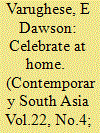

|
|
|
|
|
| Summary/Abstract |
This article examines a particular body of post-millennial fiction in English from India whose narratives draw significantly on Hindu epics and the historical contexts of early Bharat. This body of fiction includes works by Amish Tripathi, Nilanjan P. Choudhury, Ashwin Sanghi amongst others, and I refer to this writing as ‘Bharati Fantasy’ (my term). The article deals with how this new body of fiction might be received in the global literary market as well as how it is received in the domestic market given that some of these novels are ‘for sale in India only’. The article postulates how genre categorisation might affect an Indian writer's presence in the global literary market. Furthermore, it looks at how important it is to be present in such global markets, and considers how the domestic market of India provides a readership and marketing arena which are significantly self-sustaining and independent of the global literary markets. The popularity of ventures in India such as the Jaipur and Bangalore literature festivals, the recent launch of Doordarshan's ‘Kitaabnama' and hunger for ‘popular’ literature by a readership with enhanced disposable income suggest that home-grown talent is increasingly well celebrated and appreciated at home.
|
|
|
|
|
|
|
|
|
|
|
|
|
|
|
|
| 2 |
ID:
186823
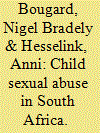

|
|
|
|
|
| Summary/Abstract |
Child sexual abuse and the criminogenesis thereof are notably not perpetrated in isolation from physical and emotional abuse – although empirical evidence suggests that the most profound impact thereof revolves around a desire to escape (as a coping mechanism) into a world of deviant sexual fantasy, rape and murder. The article explores a phenomenological case study analysis of a serial rapist and murderer from birth to early adulthood, prior to incarceration – and it depicts an existence driven by fatal sadistic sexual desires, hate and lethal intent. The researchers conducted face-to-face interviews with the participant comprising of three one-hour interviews, with the aid of a semi-structured interview schedule. The study highlighted the need for a proactive response in rendering psychosocial services to the abused child.
|
|
|
|
|
|
|
|
|
|
|
|
|
|
|
|
| 3 |
ID:
089508
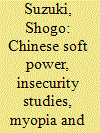

|
|
|
|
|
| Publication |
2009.
|
| Summary/Abstract |
This article is critical of a series of works on Chinese soft power which have garnered much attention in recent years. These works typically portray Chinese soft power, characterised by its disregard for Western models of development that propagate 'democratic governance', as a latent threat to global order. The article argues that such claims are premature, and to date there is little evidence of a systematic attempt by the Chinese to propagate a 'Beijing model' of autocratic development. These claims are substantiated by analysing China's participation in United Nations peacekeeping operations in Africa, which are characterised by mandates aimed at transforming war-torn states into liberal democracies. I suggest that China's participation in these operations is a crucial component of its 'charm offensive' aimed at the West, and designed to allay fears of a 'China Threat'. The article argues that Chinese understandings of soft power are diverse and directed at multiple audiences. The tendency to 'look for potential threats' in many Western policy-informed works, however, ignores the multifaceted nature and diverse views on Chinese soft power, and clouds our ability to understand this new phenomenon in Chinese foreign policy
|
|
|
|
|
|
|
|
|
|
|
|
|
|
|
|
| 4 |
ID:
189991
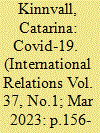

|
|
|
|
|
| Summary/Abstract |
This short article discusses how different fantasy narratives have come together during the Covid-19 crisis in various far-right movements, parties and audiences across the world and how much of these fantasies rely on racialised and gendered notions of a fantastical world-order in which particular forms of emotional governance provide a relief and sense of security to certain societal groups. This involves a close engagement with crisis and crisis narratives in relation to ontological insecurity and anxiety; how such crisis narratives have materialised in fantasies related to borders and corona nationalism, and the emotional governance of these particular fantasies in the hands of populist leaders and their increasingly receptive audiences.
|
|
|
|
|
|
|
|
|
|
|
|
|
|
|
|
| 5 |
ID:
130741
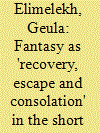

|
|
|
|
|
| Publication |
2014.
|
| Summary/Abstract |
Isaac Bar Moshe (1927-2004) was born in Baghdad and immigrated to Israel in 1950. This article deals with his literary world, which is split between realism on the one hand and fantasy, mysticism and dreams on the other, with both these planes reflecting his perspective on various existential questions. The article focuses on the short stories in his book Behind the Wall (1973), which, like many of his other works, are largely anchored in his private life and depict a bleak reality, with dreams and fantasy offering the only hope of escape into a better, more spiritual world. The article concludes with an analysis of Bar Moshe's stories in terms of the three functions of fantasy - 'recovery, escape and consolation' - as formulated by writer and philologist J.R.R. Tolkien in his book Tree and Leaf.
|
|
|
|
|
|
|
|
|
|
|
|
|
|
|
|
| 6 |
ID:
106800
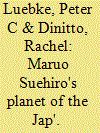

|
|
|
|
|
| Publication |
2011.
|
| Summary/Abstract |
The graphic retelling of history in popular manga, particularly in the work of Kobayashi Yoshinori, has garnered attention in light of the resurgent nationalism of postbubble Japan. This article analyzes the visual-verbal language of cult manga artist Maruo Suehiro's 'Nihonjin no wakusei: Planet of the Jap' (1985). While appearing to revel in a violent depiction of an alternative outcome to World War Two, this manga spans allusions to the Emperor Meiji, the postwar Self-Defense Forces, and the suicides of General Nogi and Mishima Yukio, and aims through its portrayal to critique the links among the Japanese wartime state, contemporary nationalism, fascism and violence. Maruo's consistent use of fascist imagery consciously invites a dangerous voyeurism of traumatic historical events. This is an intentionally political move that forces the reader to realize that complicity in such violent spectacles is a necessary step to critiquing the extreme aggression Maruo attributes to Japan.
|
|
|
|
|
|
|
|
|
|
|
|
|
|
|
|
| 7 |
ID:
162489
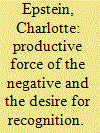

|
|
|
|
|
| Summary/Abstract |
In this article I theorise the concept of misrecognition that we aim to bring to the study of international politics with this Special Issue. I draw upon three sources to do so: recognition theory, Hegel, and Jacques Lacan. I show that, while the seeds of an interest in misrecognition were laid in that interdisciplinary Hegelian scholarship known as recognition theory, it remains underdeveloped. To develop it into a concept I chart a path through recognition theory back to Hegel’s original dialectic of the master and servant in the Phenomenology of Spirit. What the dialectic captures, I argue, are the actual dynamics of misrecognition in social life, not an idealised form of recognition. This foundational, constitutive misrecognition is what Lacan also theorises by way of his concept of ‘fantasy’. Both Hegel and Lacan foreground a misrecognised, desiring subject that challenges the ways in which agency has been understood in international politics. Lastly, I show the purchase of a Hegelian-Lacanian analysis for IR by considering the relations between sovereignty and nuclear weapons under the lens of fantasy.
|
|
|
|
|
|
|
|
|
|
|
|
|
|
|
|
|
|
|
|
|